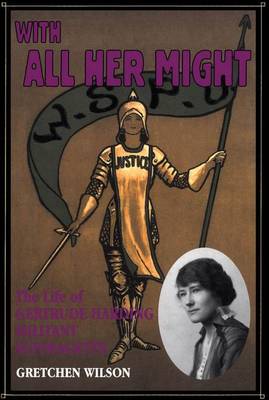Born in 1889, Gertrude Harding spent a boistrous childhood on a Welsford, New Brunswick, farm. She travelled to Hawaii to live with her sister, and, when her sister moved to London in 1912, Harding went with her. One day, from the top of a London bus, she saw a parade of women carrying large white posters. Attended by a policeman, they walked in single file on the street close to the curb as passersby stared and shouted rude remarks. It was a poster-parade of Militant Suffragettes demanding votes for women; after more than two decades of mild action, the Suffragettes were on the warpath. Gertrude Harding couldn't wait to join them. After a short initiation, Harding and a comrade-in-arms hit conservative Englishmen in a very tender spot: they smashed up the orchid house at Kew Gardens. Then, to counter government violence, Harding organized a cadre of women who learned jujitsu and wore Indian clubs on their belts. This bodyguard had two jobs: to deter the policemen who tried to haul Suffragettes off to prison, and to arrange escapes for Suffragettes on the run. When the politicians changed tactics and the bodyguard's work decreased, Harding served as a private secretary to Christabel Pankhurst, the movement's strategist. Then, as World War I intensified, Harding became the publisher of the Suffragette newspaper, again staying one jump ahead of the police. During the War, Harding found her second career: she became a social worker among women labourers in a munitions plant. Afterwards, she did social work in industrial New Jersey. When she retired, she gardened and sold jam, and she also wrote her memoirs, which she illustrated with sketches and snapshots. Finally, old and ill, she returned to Rothesay, New Brunswick, where she died in 1977.
- ISBN10 0864926111
- ISBN13 9780864926111
- Publish Date 16 November 2014 (first published 1 May 1996)
- Publish Status Out of Stock
- Imprint Goose Lane Editions
- Format eBook
- Pages 264
- Language English
